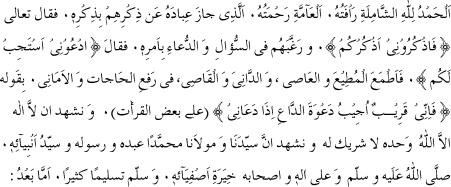![]()
In the name of Allah, the Beneficient, the Merciful
![]()
We praise Allah, the Most High, Most Great, and pray for Allah’s blessings
upon His noble Prophet.
![]()
![]()


(
![]() )
)
![]()
Introduction
All praise is for Allah, Whose compassion is all-encompassing, Whose mercy is
universal- the One Who rewards His servants by His remembrance when they
remember Him. For Allah, Most High, has said: “So remember Me, I will remember
you.” And He awakens in His servants the desire to ask and supplicate to Him,
with His command: “Ask of Me, I will answer you.” And He has made His
servants desirous of raising their needs unto Him, with His saying: “Truly I
am near- I answer the call of the caller when he calls upon Me.” And we bear
witness that there is no god except Allah, the One Who has no partners, and we
bear witness that our master and guide, Muhammad ![]() is His servant and messenger and the master of all His messengers. Peace and
blessings of Allah be upon him and his family and his companions, the best of
companions.
is His servant and messenger and the master of all His messengers. Peace and
blessings of Allah be upon him and his family and his companions, the best of
companions.
Truly the remembrance (dhikr) of Allah and raising one’s needs up to
him is the best form of worship that can be uttered by the tongue after the
recitation of the Qur’aan. The Prophet ![]() said: “No people sit and remember Allah except that the angels surround them
and mercy encompasses them and tranquility descends upon them and Allah mentions
them among those who are with Him.” And he
said: “No people sit and remember Allah except that the angels surround them
and mercy encompasses them and tranquility descends upon them and Allah mentions
them among those who are with Him.” And he ![]() also said: “The likeness of the one who remembers his Lord and the one who
does not remember is like life and death.” Also, “Du’aa
(supplication) is the core of all worship.” Also, “There is no thing more
noble-seeming to Allah than du’aa.” Again, he
also said: “The likeness of the one who remembers his Lord and the one who
does not remember is like life and death.” Also, “Du’aa
(supplication) is the core of all worship.” Also, “There is no thing more
noble-seeming to Allah than du’aa.” Again, he ![]() said: “Truly du’aa affects that (situation) which has occurred and that
which is yet to occur. So engage yourselves, O servants of Allah, with du’aa.”
Finally, he said: “Whoever does not ask anything of Allah, He becomes angry
with him.” And Allah, Most High, has said:
said: “Truly du’aa affects that (situation) which has occurred and that
which is yet to occur. So engage yourselves, O servants of Allah, with du’aa.”
Finally, he said: “Whoever does not ask anything of Allah, He becomes angry
with him.” And Allah, Most High, has said:
“O you who believe! Remember Allah with much remembrance and glorify and
praise Him in the morning and the evening.”
In light of these verses and traditions of the Prophet
![]() , this booklet has been developed to
provide a selected set of supplications which are to be read at various times
during the day and night. These remembrances (dhikr) and supplications (du’aa)
have been extracted from various narrations of the Prophet
, this booklet has been developed to
provide a selected set of supplications which are to be read at various times
during the day and night. These remembrances (dhikr) and supplications (du’aa)
have been extracted from various narrations of the Prophet
![]() , some of which are given in English
below the du’aa itself- most can be found in the hadeeth collection of Mishkât-ul-Masâbîh.
The idea of this collection is that every child should be able to memorize these
short prayers and then recite them consistently as they go about their daily
lives. By bringing such remembrance of Allah into our lives, we will insha
Allah be granted those rewards which Allah and His Prophet
, some of which are given in English
below the du’aa itself- most can be found in the hadeeth collection of Mishkât-ul-Masâbîh.
The idea of this collection is that every child should be able to memorize these
short prayers and then recite them consistently as they go about their daily
lives. By bringing such remembrance of Allah into our lives, we will insha
Allah be granted those rewards which Allah and His Prophet
![]() have promised us for keeping
Allah’s remembrance. There are many general etiquettes of supplication which
are not described in this booklet but insha Allah will be discussed as
appropriate. This booklet also includes only those du’aa which are not
directly connected with the salaat.
have promised us for keeping
Allah’s remembrance. There are many general etiquettes of supplication which
are not described in this booklet but insha Allah will be discussed as
appropriate. This booklet also includes only those du’aa which are not
directly connected with the salaat.
Any corrections or suggestions should kindly be forwarded to the
publisher.
Nadeem
Abdul Hamid